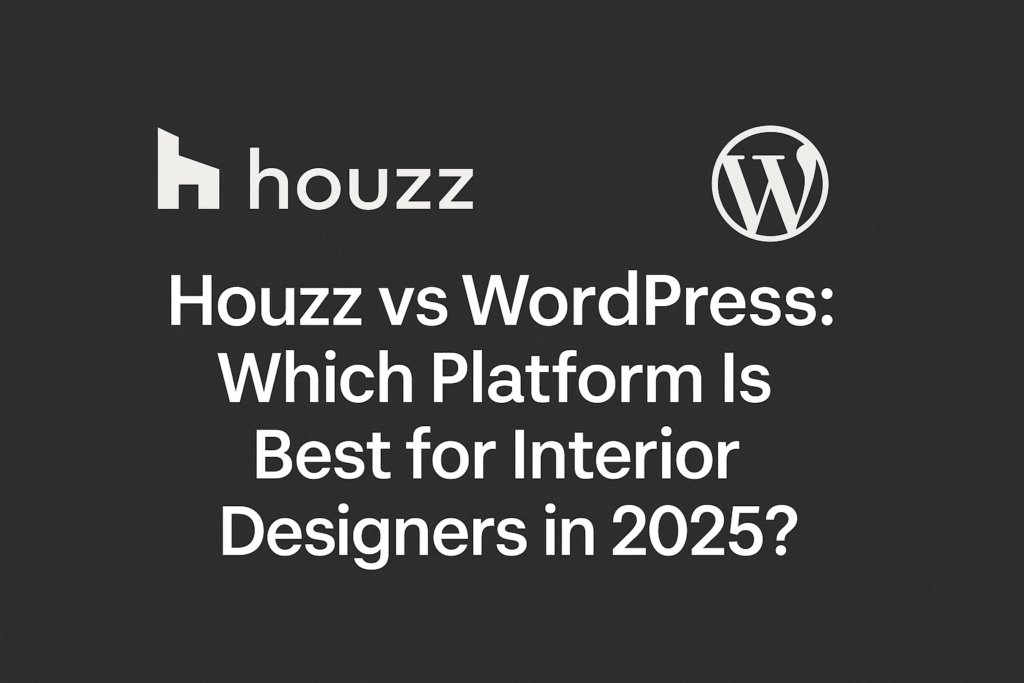Houzz vs WordPress: Which Platform Is Best for Interior Designers in 2025?

If you’re an interior designer in the UK looking to elevate your online presence in 2025, choosing the right platform to showcase your portfolio, attract clients, and grow your business is critical. Two popular options often come up: Houzz and WordPress. Each has distinct features, advantages, and limitations — but which one suits your business best?
At Digital Web London, a web design agency specialising in WordPress development, SEO, and e-commerce solutions, we’ve helped many interior designers find the perfect digital home. In this blog, we’ll compare Houzz and WordPress from multiple angles to help you make an informed decision.
What is Houzz?
Houzz is a leading online platform dedicated to home improvement, interior design, and architecture. It combines a massive community of homeowners and professionals with tools for showcasing portfolios, receiving reviews, and even managing leads.
Pros of Houzz for Interior Designers:
- Built-in audience: Access to millions of users searching specifically for design inspiration and professionals.
- Profile and portfolio management: Easy to upload projects, photos, and customer reviews.
- Community interaction: Join discussions, answer questions, and build credibility.
Cons of Houzz:
- Limited customisation: Profiles follow a uniform template, restricting branding flexibility.
- Commission and advertising costs: To maximise visibility, paid promotion is often necessary.
- Lack of full control: Your presence is tied to Houzz’s ecosystem and policies.
What is WordPress?
WordPress is the world’s most popular website platform powering over 40% of the web. It offers limitless flexibility, customisation, and control — perfect for interior designers wanting a bespoke website tailored to their brand and business goals.
Pros of WordPress for Interior Designers:
- Total customisation: Build a unique website with your branding, style, and features.
- SEO friendly: Powerful SEO plugins like Yoast and Rank Math to boost search engine rankings.
- Scalability: Add blogs, e-commerce, booking systems, and more as your business grows.
- Ownership: You control your website, content, and data entirely.
Cons of WordPress:
- Steeper learning curve: Requires some technical know-how or agency support.
- Ongoing maintenance: Updates, backups, and security require attention.
- Initial setup: Takes longer to build compared to setting up a Houzz profile.
Houzz vs WordPress: Key Features Comparison
Feature | Houzz | WordPress |
Customisation | Limited to profile and project layout | Full control over design and content |
SEO | Basic profile SEO | Advanced SEO tools and plugins |
Lead Generation | Built-in, with paid promotion options | Through optimised content, forms, ads |
Cost | Free profile; paid ads and premium listings | Hosting, domain, theme, and maintenance |
Branding | Limited branding options | Full branding freedom |
Scalability | Limited to portfolio & client interactions | Expandable with plugins and features |
Content Ownership | Owned by Houzz | Fully owned by you |
How Digital Web London Can Help
Choosing between Houzz and WordPress can be tricky, but you don’t have to decide alone. As a top London web design agency, we specialise in creating bespoke WordPress websites tailored for interior designers. We focus on clean, modern designs that highlight your portfolio while optimising your site for SEO and conversions.
If you’re serious about growing your interior design business online, contact Digital Web London for a free consultation. Let’s build a digital presence that works as beautifully as your interiors.
Final Thoughts
Both Houzz and WordPress offer valuable tools for interior designers in 2025, but your business goals should guide your choice. Houzz is great but WordPress offers long-term growth potential with complete control and SEO power.


